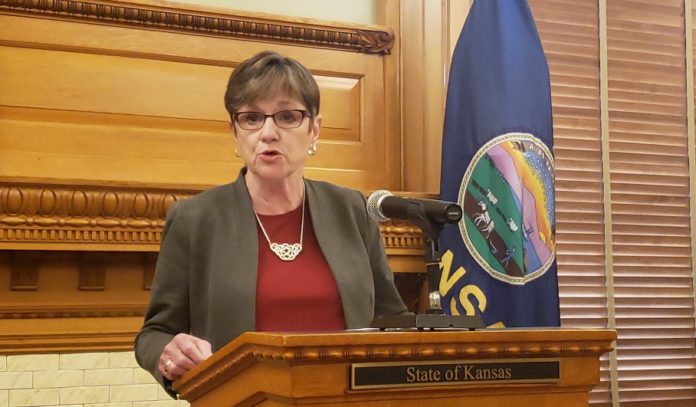Gov. Laura Kelly questions the need for a law that would bar employers from punishing employees if they don’t get vaccinated.
“It is a solution in search of a problem,” Kelly said.
“There have been no accounts of employers forcing folks,” she said.
“If anything, I think, they’ve been incredibly flexible in recognizing that some people may choose not to and they’re accommodating that. I don’t think it’s necessary.”
Kelly made her comments this week ahead of Thursday’s hearing on a bill, which would allow a court to award an employee actual damages or $1,000, whichever is greater, if an employee is punished for not being vaccinated.
The bill comes as COVID-19 vaccines filter into communities across the country and employers are confronted with how to keep their workers and customers safe.
The Senate Commerce Committee heard testimony on Thursday from Kansans who compared any effort to require vaccines to bullying and coercion, and one even put it on the level of Japanese internment camps during Word War II.
“Many us would sooner be unemployed than face risks from an experimental vaccine for a disease unlikely to be life threatening,” JoAnn Farb told the committee.
“This is your opportunity to be on the right side of history,” Farb said.
“Please, don’t make people choose between holding onto their job and being coerced into injecting something that may cause catastrophic injuries down the road.”
Farb was joined by Connie Newcome, founder of Kansans for Health Freedom, who compared the legislation to the constitutional amendment on abortion that will go to the polls.
Newcome said employers are not suited to recommend – or require – medical procedures.
“Employees are not slaves,” Newcome said. “Employers hire to get work done not to be vaccine bullies. Bullying, coercion and bribery for vaccinations are not acceptable from anyone, employers or otherwise.”
The bill drew opposition from the Kansas Hospital Association and the Kansas Chamber of Commerce, among others.
The Hospital Association noted that the Centers for Disease Control and Prevention recommended that health care workers are vaccinated against influenza, measles and mumps, among others.
“We believe it is important for hospitals to have local control of policies that promote the highest level of health outcomes, patient care and safety in their facilities,” KHA lobbyist Tara Mays told the committee in written testimony.
“To that end, some hospitals may choose to follow the recommendations of the CDC and require flu vaccinations of employees in an effort to protect the health and safety of patients, other hospital employees, and the communities at large.”
Republican state Rep. John Eplee, a physician from Atchison, also testified against the bill.
He said the legislation put health care institutions at risk from either being sued by employees required to be vaccinated or sued by patients who got sick from health care workers who had not been vaccinated.
“It’s really a no-win situation,” Eplee said. “You really need to think about that in the preemption you’re imposing on business to make those decisions.”
The debate over employer-mandated vaccines has been percolating in state legislatures since December, when the U.S. Equal Employment Opportunity Commission said employers could mandate COVID-19 vaccinations as long as they accommodate workers with religious objections or have disabilities that would prevent them from getting inoculated.
Since the EEOC issued its guidance, a handful of states have responded with legislation similar to the Kansas bill that would keep employers from taking a hardline position on vaccines.
Legislation is believed to have been introduced in at least nine states, with bills intended to keep state and local governments as well as private employers from mandating vaccinations.
Experts are skeptical about whether employers will require COVID-19 vaccines.
A survey done last month by Littler Mendelson, a national law firm that handles employment and labor litigation, found that few employers already mandate vaccines, with a large number not planning to require them.
Less than 1% currently require vaccines for all employees, and only 6% said they plan to mandate COVID-19 vaccines once they’re readily available.
Still, the survey of 1,800 in-house lawyers, human resource professionals and corporate executives across the country found that 43% haven’t written off the idea of a mandate, while 48% said it wouldn’t be required.
















